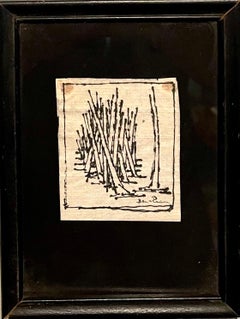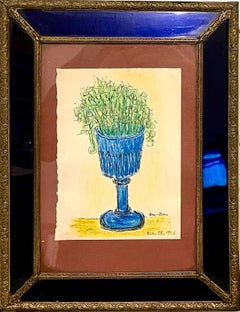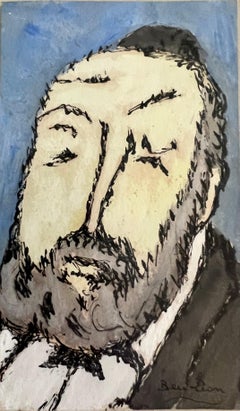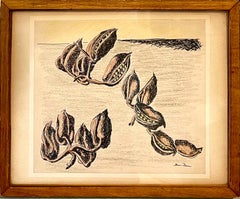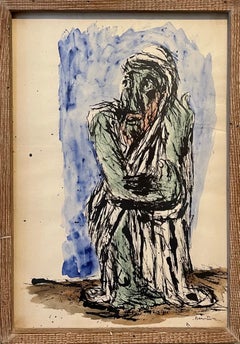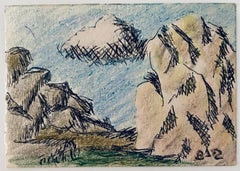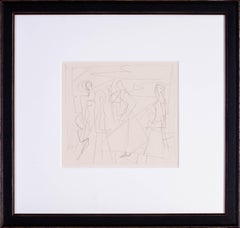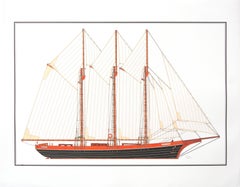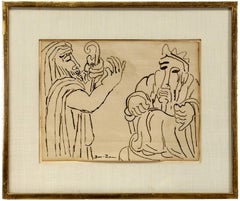Ben-Zion Weinman Drawings and Watercolor Paintings
to
9
1
Overall Width
to
Overall Height
to
10
1
2
8
1
7
3
1
1
1
7
7
5
5
3
21
930
406
282
279
6
10
Artist: Ben-Zion Weinman
Expressionist Miniature Drawing Wheat Stalks American Modernist Ben Zion WPA
By Ben-Zion Weinman
Located in Surfside, FL
Expressionist ink drawing of wheat stalks
There is an inscription "Happy New Year" on verso
Hand signed
Framed it measures 7.75 X 5.75
The actual paper is 3 X 3.5
Born in 1897, Ben-...
Category
1950s Expressionist Ben-Zion Weinman Drawings and Watercolor Paintings
Materials
Ink
Expressionist Color Drawing Cobalt Glass Vintage Frame Modernist Ben Zion WPA
By Ben-Zion Weinman
Located in Surfside, FL
Expressionist ink and pastel crayon drawing of flowers in vase.
Framed in a vintage cobalt blue glass original frame
Hand signed and dated
Framed it measures 13.5 X 10.5
The actual ...
Category
1950s Expressionist Ben-Zion Weinman Drawings and Watercolor Paintings
Materials
Paper, Oil Crayon, Pastel, Ink
Ben ZIon Expressionist Judaica Rabbi Watercolor Painting Jewish Modernist WPA
By Ben-Zion Weinman
Located in Surfside, FL
Frame measures 13.5 X 11.5
Paper measures 6.5 X 4 inches
Hand signed lower right
Watercolor painting of prophet or Rabbi, Judaica artwork
Born in 1897, Ben-Zion Weinman celebrated h...
Category
Mid-20th Century Expressionist Ben-Zion Weinman Drawings and Watercolor Paintings
Materials
Paper, Watercolor
Expressionist Ink, Pastel, Crayon Drawing Jewish American Modernist Ben Zion WPA
By Ben-Zion Weinman
Located in Surfside, FL
Expressionist ink and pastel crayon drawing of beans (carobs, flowers?) in pods
Hand signed.
Born in 1897, Ben-Zion Weinman celebrated his European Jewish heritage in his visual wo...
Category
Mid-20th Century Expressionist Ben-Zion Weinman Drawings and Watercolor Paintings
Materials
Paper, Oil Crayon, Pastel, Ink
Abstract Expressionist Rabbi Watercolor Painting Jewish American Modernist WPA
By Ben-Zion Weinman
Located in Surfside, FL
Watercolor painting of standing prophet or Rabbi, Judaica artwork
Born in 1897, Ben-Zion Weinman celebrated his European Jewish heritage in his visual works as a sculptor, painter, ...
Category
Mid-20th Century Expressionist Ben-Zion Weinman Drawings and Watercolor Paintings
Materials
Paper, Watercolor
Pastel, Ink Drawing Rocks And Cloud Landscape Jewish American Modernist WPA
By Ben-Zion Weinman
Located in Surfside, FL
Miniature Landscape
Provenance: Virginia Field, Arts administrator; New York, N.Y. Assistant director for Asia House gallery. (she was friends with John von Wicht and Andy Warhol)
Born in 1897, Ben-Zion Weinman...
Category
Mid-20th Century Expressionist Ben-Zion Weinman Drawings and Watercolor Paintings
Materials
Pastel, Ink, Watercolor
Abstract Drawing Watercolor Painting Totem Column Jewish American Modernist WPA
By Ben-Zion Weinman
Located in Surfside, FL
Miniature Abstract Totem. Signed with initials.
Provenance: Virginia Field, Arts administrator; New York, N.Y. Assistant director for Asia House gallery. (she was friends with John v...
Category
Mid-20th Century Expressionist Ben-Zion Weinman Drawings and Watercolor Paintings
Materials
Ink, Watercolor
Modernist Judaica Jewish Ink Drawing Painting "New Immigrant" Off the Boat WPA
By Ben-Zion Weinman
Located in Surfside, FL
An ink drawing Judaic painting by modern artist Ben-Zion Weinman. It depicts a portrait of an old Jewish man. Coming over from Europe on a ship crossing. The work is signed "Ben-Zion".
Born in 1897, Ben-Zion Weinman celebrated his European Jewish heritage in his visual works as a sculptor, painter, and printmaker. Influenced by Spinoza, Knut Hamsun, and Wladyslaw Reymont, as well as Hebrew literature, Ben-Zion wrote poetry and essays that, like his visual work, attempt to reveal the deep “connection between man and the divine, and between man and earth.”
An emigrant from the Ukraine, he came to the US in 1920. He wrote fairy tales and poems in Hebrew under the name Benzion Weinman, but when he began painting he dropped his last name and hyphenated his first, saying an artist needed only one name. In 1920 he settled in America, where he found little interest in his writing. He began teaching Hebrew to support himself and then in the early 1930s returned to painting. He used his art to comment on the rise of fascism in Europe, events he felt could not be adequately explored with words. Largely self-taught, Ben-Zion visited the museums of New York City to learn his new trade. His first painting on a large scale, Friday Evening (1933, Jewish Museum, New York), depicts a Sabbath dinner table as recalled from his family home. Ben-Zion supported himself by working odd jobs until the establishment of the Works Progress Administration's Federal Art Project. Under the auspices of the wpa, Ben-Zion thrived and galleries began to show his work. In 1936, after his first one-man show at the Artists' Gallery in New York
Ben-Zion was a founding member of “The Ten: An Independent Group” The Ten” a 1930’s...
Category
1940s American Modern Ben-Zion Weinman Drawings and Watercolor Paintings
Materials
Watercolor, Gouache
Ben ZIon Expressionist Judaica Rabbi Watercolor Painting Jewish Modernist WPA
By Ben-Zion Weinman
Located in Surfside, FL
Frame measures 13.5 X 11.5
Paper measures 6.5 X 5 inches
Hand signed lower right
Watercolor painting of prophet or Rabbi, Judaica artwork
Born in 1897, Ben-Zion Weinman celebrated h...
Category
Mid-20th Century Expressionist Ben-Zion Weinman Drawings and Watercolor Paintings
Materials
Paper, Watercolor
STILL LIFE WITH BOWL OF FRUIT AND PITCHER
By Ben-Zion Weinman
Located in Portland, ME
Ben-Zion. STILL LIFE WITH BOWL OF FRUIT AND PITCHER.
Watercolor on paper.
Signed within the image, right.
2 3/8 x 3 3/4 inches.
In excellent c...
Category
Mid-20th Century Ben-Zion Weinman Drawings and Watercolor Paintings
Materials
Watercolor
Related Items
German Expressionist drawing of abstracted figures by Carl Hofer
By Carl Hofer
Located in Petworth, West Sussex
Carl Hofer (German, 1875 – 1955)
Abstract figures
Pencil on paper
8.1/4 x 9 in. (21 x 23 cm.)
With studio stamp (on the reverse) and signature of the artist’s wife Elizabeth Hofer
Provenance: These works come from the artist’s second wife Elizabeth and from then by descent.
Carl Hofer was a German expressionist painter and the director of the Berlin Academy of Fine Arts. One of the most important painters of the Expressionist movement, his work was among those that was considered degenerate art by the Nazis. He studied in Karlsruhe under Hans Thoma. He first visited Paris in 1899 making acquaintance with Julius Meier-Graefe. In 1902 he studied in Stuttgardt and became friends with the sculptor Hermann Haller...
Category
20th Century Expressionist Ben-Zion Weinman Drawings and Watercolor Paintings
Materials
Paper, Pencil
$2,206
H 8.25 in W 9 in D 1 in
"Freedom", Orange and Black Three-Masted Schooner Ink Drawing
By Philippe Mallet
Located in Clermont-Ferrand, Auvergne-Rhône-Alpes
This artwork depicts a three-masted schooner named Freedom, hailing from New-York. The boat has brown booms, masts, keel and bow, and black and orange hull...
Category
2010s Other Art Style Ben-Zion Weinman Drawings and Watercolor Paintings
Materials
Paper, Ink
$597
H 21.66 in W 27.56 in
1920's Illustration of a Country Girl
Located in Soquel, CA
Finely detailed figurative illustration of a young woman leaning against a fence. The woman is wearing a plaid dress and bonnet with a black ribbon. Some of the landscape has been il...
Category
1920s Realist Ben-Zion Weinman Drawings and Watercolor Paintings
Materials
Paper, Watercolor, Ink, Gouache
"Abstract Composition X" Abstract Painting 10" x 14" in by Shaker El Maadawy
Located in Culver City, CA
"Abstract Composition X" Abstract Painting 10" x 14" in by Shaker El Maadawy
signed & dated
Shaker El Maadawy graduated from the Faculty of Fine Arts in painting in 1967 in his nat...
Category
20th Century Abstract Expressionist Ben-Zion Weinman Drawings and Watercolor Paintings
Materials
Paper, Watercolor
"Abstract Composition XI" Abstract Painting 10" x 14" in by Shaker El Maadawy
Located in Culver City, CA
"Abstract Composition XI" Abstract Painting 10" x 14" in by Shaker El Maadawy
signed & dated
Shaker El Maadawy graduated from the Faculty of Fine Arts in painting in 1967 in his na...
Category
20th Century Abstract Expressionist Ben-Zion Weinman Drawings and Watercolor Paintings
Materials
Paper, Watercolor
"Sleeping Figures" Watercolor Abstract Painting 10" x 14"in by Shaker El Maadawy
Located in Culver City, CA
"Sleeping Figures" Watercolor Abstract Painting 10" x 14"in by Shaker El Maadawy
signed & dated
Shaker El Maadawy graduated from the Faculty of Fine Arts in painting in 1967 in his...
Category
20th Century Abstract Expressionist Ben-Zion Weinman Drawings and Watercolor Paintings
Materials
Paper, Watercolor
The Tree of Life, Expressionist Drawing Landscape Watercolor Paper in Soft Tones
Located in Barcelona, ES
This is a beautiful expressionist style drawing by Juanjo Saez. Juanjo's pictorial work is an exploration of color, texture, and movement, creating vibrant compositions that capture ...
Category
2010s Expressionist Ben-Zion Weinman Drawings and Watercolor Paintings
Materials
Paper, Wax Crayon
Figures in Motion with Roses - Pointillist Figurative Abstract
By Ben Black
Located in Soquel, CA
Highly detailed india ink abstract pointillist drawing of figures and roses with watercolor and gouache by Ben Black (American, 1922-2003), c.1990's. Signed "Ben Black" lower right. ...
Category
1990s Pointillist Ben-Zion Weinman Drawings and Watercolor Paintings
Materials
Paper, Watercolor, India Ink, Gouache
$875
H 7 in W 14 in D 1 in
Woodland Scene, 1956 circa - Gouache and Pastel Painting, Green Trees + Leaf
By Peter Potworowski
Located in Kingsclere, GB
Peter Potworowski 1898-1962
Woodland Scene, 1956, circa
gouache and pastel
25.1 x 28.2 cm
9 7/8 x 11 1/8 in
unsigned
Tadeusz Piotr (Peter) Potworowski was a Polish abstract and figu...
Category
20th Century Ben-Zion Weinman Drawings and Watercolor Paintings
Materials
Pastel, Gouache
"#70 – I AM TIRED", ink, pencil, gouache, collage, vintage, hemingway, poetry
By Amy Williams
Located in Toronto, Ontario
"#70 – I AM TIRED" is from Amy Williams' series "A Farewell to Arms" – wherein the artist works directly onto page 70 of a found copy of Ernest Hemingway'...
Category
21st Century and Contemporary Contemporary Ben-Zion Weinman Drawings and Watercolor Paintings
Materials
Paper, Found Objects, Ink, Gouache, Pencil
Le Pont Neuf
By Lucien Génin
Located in London, GB
'Le Pont Neuf', gouache on fine art paper, by Lucien Génin (circa 1930s). The Pont Neuf is the oldest standing bridge across the river Seine in Paris, France. It stands by the western point of the Île de la Cité, the island in the middle of the river that was, between 250 and 225 BC, the birthplace of Paris. It is called 'The New Bridge' because at the time of its inauguration (built 1578-1607), it embodied a very modern look compared to other bridges which spanned the Seine. Lucien Génin has captured its beauty in this lively depiction from the 1930s. Just before the bridge is a 'Bateau Mouche' an open excursion boat that provides visitors with a view of the city from along the river. The artwork is in good overall condition commensurate with age and medium used. It has been newly frame with anti-reflective glass. Please enjoy the photos accompanying this listing. Signed by the artist in the lower left hand. Upon request a video may be provided.
About the Artist: After the devastation of the First World War, Lucien Génin (1894 - 1953) left his provincial home in the autumn of 1919 to find his fortune among the lively Parisians in the heart of Montmartre. Génin befriended the painters Frank Will, Gen Paul, Émile Boyer, Marcel Leprin...
Category
1930s Expressionist Ben-Zion Weinman Drawings and Watercolor Paintings
Materials
Paper, Gouache
'Mother Nature', Lyrical Surrealist Abstract Watercolour on Paper.
Located in Cotignac, FR
Mid-century lyrical surrealist abstract watercolour on paper by French artist Jean Clerté, signed and dated bottom right. Presented in mid-century frame.
Jean Clerté , born in 1930 in Saint-Savin-sur-Gartempe in Vienne, is a French painter, engraver, draftsman, watercolourist and sculptor . This work is a great example of his more humorous and expressive work influenced by Alechinsky from the late 1960s onwards. There is a light playfulness and yet the watercolours are more vivid than his previous palette.
Jean Clerté works in series. His sequential narrations testify both to a youthful spontaneity and to a perfect mastery in the distribution of forms and images on the painted surface. The narration is not only an accumulation of juxtaposed fragments and symbols, it forms a whole, it takes on and gives meaning. In general, we can say of Clerté that he practices an “eco-art” that feeds on primary hungers: the feeling of being united with nature, the vegetable, the mineral, the aquatic. In his colourful canvases, his inks, his boxes, his objects, like a shaman on the path of his dreams, the painter Clerté mounts an assault on beasts and demons, elves and gnomes. From the Poitevin marshes to the tropical forests emerges a fauna caught in the meanders of a design that marvels at the appearance of these grotesque idols.
Jean Clerté began to draw and paint at a very young age, and at the age of 15 he enrolled at the École des Beaux-Arts in Poitiers. Then in 1949, curious about the capital, he moved to Paris. Having very few financial resources, he could not continue his studies at first, worked as a model to survive, and met other artists; he was then admitted to the studio of Ossip Zadkine and, from 1952, he was also able to study engraving at Atelier 17 of Stanley William Hayter, an English engraver and printer living in Paris associated in the 1930s with surrealism.
At the end of the 1960s, he worked alongside Pierre Alechinsky, founding member of the Cobra movement, engraving Alechinsky's originals, benefiting from his advice, and discovering acrylic as a medium.
From 1976, Jean Clerté became associate professor at Hayter. Clerté had taught previously, in 1971 at the Salzburg Summer University and in 1972 he gave courses at the Paris-Sorbonne University . In 1981, he was appointed professor at the School of Decorative Arts , where he had Maïlys Seydoux-Dumas as a student and, from 1983 to 1988, he was Alechinsky's assistant professor at the Paris School of Fine Arts.
His first works are part of the current of lyrical abstraction, and are nourished by impressions of nature (landscape motifs, e.g. forest fires, waterscapes), then around 1968, encouraged by Alechinsky, he rejects abstraction, and his work becomes more figurative with expressive and humorous elements. From this period his colours are more subdued, often with pastel tones, he works on series. Jean Clerté has created a world in a space where drawing, painting, objects participate in a playful figuration. From his drawings were born sculptures and sometimes mobiles (Le Moulin à dessin). If it is the artist who makes astonishing, polychrome, whimsical “toys”, it is the painter who appeals to adults through his caustic and satirical humour.
His first exhibitions in France took place at the Galerie Massol , then at the Galerie Pascal...
Category
Mid-20th Century Expressionist Ben-Zion Weinman Drawings and Watercolor Paintings
Materials
Paper, Watercolor
$1,015
H 22.05 in W 28.75 in D 2.37 in
Previously Available Items
Biblical Scene, (2 Jewish Men) 1930s Modernist Ink Drawing
By Ben-Zion Weinman
Located in Surfside, FL
Born in 1897, Ben-Zion Weinman celebrated his European Jewish heritage in his visual works as a sculptor, painter, and printmaker. Influenced by Spinoza, Knut Hamsun, and Wladyslaw Reymont, as well as Hebrew literature, Ben-Zion wrote poetry and essays that, like his visual work, attempt to reveal the deep “connection between man and the divine, and between man and earth.”
An emigrant from the Ukraine, he came to the US in 1920. He wrote fairy tales and poems in Hebrew under the name Benzion Weinman, but when he began painting he dropped his last name and hyphenated his first, saying an artist needed only one name.
Ben-Zion was a founding member of “The Ten: An Independent Group” The Ten” a 1930’s avant-garde group, Painted on anything handy. Ben-Zion often used cabinet doors (panels) in his work. Other members of group included Ilya Bolotowsky, Lee Gatch, Adolf Gottlieb...
Category
Early 20th Century Ben-Zion Weinman Drawings and Watercolor Paintings
Materials
Paper, Ink
Expressionist Miniature Drawing Wheat Stalks American Modernist Ben Zion WPA
By Ben-Zion Weinman
Located in Surfside, FL
Expressionist ink drawing of wheat stalks
There is an inscription "Happy New Year" on verso
Hand signed
Framed it measures 7.75 X 5.75
The actual paper is 3 X 3.5
Born in 1897, Ben-Zion Weinman celebrated his European Jewish heritage in his visual works as a sculptor, painter, and printmaker. Influenced by Spinoza, Knut Hamsun, and Wladyslaw Reymont, as well as Hebrew literature, Ben-Zion wrote poetry and essays that, like his visual work, attempt to reveal the deep “connection between man and the divine, and between man and earth.” An emigrant from the Ukraine, he came to the US in 1920. He wrote fairy tales and poems in Hebrew under the name Benzion Weinman, but when he began painting he dropped his last name and hyphenated his first, saying an artist needed only one name.
Ben-Zion was a founding member of “The Ten: An Independent Group” The Ten” a 1930’s avant-garde group, Painted on anything handy. Ben-Zion often used cabinet doors (panels) in his work. Other members of group included Ilya Bolotowsky, Lee Gatch, Adolph Gottlieb, Louis Harris, Yankel Kufeld, Marcus Rothkowitz (later known as Mark Rothko), Louis Schanker, and Joseph Solman. The Art of “The Ten” was generally described as expressionist, as this style offered the best link between modernism and social art. Their exhibition at the Mercury Gallery in New York held at the same time as the Whitney Annual Exhibition of Contemporary American Painting, included a manifesto concentrating on aesthetic questions and criticisms of the conservative definition of modern art imposed by the Whitney. Ben-Zion’s work was quickly noticed. The New York Sun said he painted “furiously” and called him “the farthest along of the lot.” And the triptych, “The Glory of War,” was described by Art News as “resounding.”
By 1939, The Ten disbanded because most of the members found individual galleries to represent their work. Ben-Zion had his first one-man show at the Artist’s Gallery in Greenwich Village and J.B. Neumann, the highly esteemed European art dealer who introduced Paul Klee, (among others) to America, purchased several of Ben-Zion’s drawings. Curt Valentin, another well-known dealer, exhibited groups of his drawings and undertook the printing of four portfolios of etchings, each composed of Ben-Zion’s biblical themes. He worked as a WPA artist.
Ben-Zion’s work is represented in many museums throughout the country including the Metropolitan, the Whitney, and the Museum of Modern Art in New York, the Art Institute of Chicago, the Philadelphia Museum of Art and the Phillips Collection, Washington. The Jewish Museum in New York opened in 1948 with a Ben-Zion exhibition.
Ben-Zion consistently threaded certain subject matter—nature, still life, the human figure, the Hebrew Bible, and the Jewish people—into his work throughout his life. "In all his work a profound human feeling remains. Sea and sky, even sheaves of wheat acquire a monolithic beauty and simplicity which delineates the transient as a reflection of the eternal. This sensitive inter- mingling of the physical and metaphysical is one of the most enduring features of Ben-Zion's works." (Excerpt from Stephen Kayser, “Biblical Paintings,” The Jewish Museum Catalogue, 1952). Mystical Imprints: Marc Chagall, Ben-Zion, and Ben Shahn presents the print work of three prominent 20th century Jewish artists born in the Russian Empire. Among these seventy pieces are etchings and lithographs from Chagall’s Bible series...
Category
1950s Expressionist Ben-Zion Weinman Drawings and Watercolor Paintings
Materials
Ink
Expressionist Color Drawing Cobalt Glass Vintage Frame Modernist Ben Zion WPA
By Ben-Zion Weinman
Located in Surfside, FL
Expressionist ink and pastel crayon drawing of flowers in vase.
Framed in a vintage cobalt blue glass original frame
Hand signed and dated
Framed it measures 13.5 X 10.5
The actual paper is 7.5 X 5.5
Born in 1897, Ben-Zion Weinman celebrated his European Jewish heritage in his visual works as a sculptor, painter, and printmaker. Influenced by Spinoza, Knut Hamsun, and Wladyslaw Reymont, as well as Hebrew literature, Ben-Zion wrote poetry and essays that, like his visual work, attempt to reveal the deep “connection between man and the divine, and between man and earth.” An emigrant from the Ukraine, he came to the US in 1920. He wrote fairy tales and poems in Hebrew under the name Benzion Weinman, but when he began painting he dropped his last name and hyphenated his first, saying an artist needed only one name.
Ben-Zion was a founding member of “The Ten: An Independent Group” The Ten” a 1930’s avant-garde group, Painted on anything handy. Ben-Zion often used cabinet doors (panels) in his work. Other members of group included Ilya Bolotowsky, Lee Gatch, Adolph Gottlieb, Louis Harris, Yankel Kufeld, Marcus Rothkowitz (later known as Mark Rothko), Louis Schanker, and Joseph Solman. The Art of “The Ten” was generally described as expressionist, as this style offered the best link between modernism and social art. Their exhibition at the Mercury Gallery in New York held at the same time as the Whitney Annual Exhibition of Contemporary American Painting, included a manifesto concentrating on aesthetic questions and criticisms of the conservative definition of modern art imposed by the Whitney. Ben-Zion’s work was quickly noticed. The New York Sun said he painted “furiously” and called him “the farthest along of the lot.” And the triptych, “The Glory of War,” was described by Art News as “resounding.”
By 1939, The Ten disbanded because most of the members found individual galleries to represent their work. Ben-Zion had his first one-man show at the Artist’s Gallery in Greenwich Village and J.B. Neumann, the highly esteemed European art dealer who introduced Paul Klee, (among others) to America, purchased several of Ben-Zion’s drawings. Curt Valentin, another well-known dealer, exhibited groups of his drawings and undertook the printing of four portfolios of etchings, each composed of Ben-Zion’s biblical themes. He worked as a WPA artist.
Ben-Zion’s work is represented in many museums throughout the country including the Metropolitan, the Whitney, and the Museum of Modern Art in New York, the Art Institute of Chicago, the Philadelphia Museum of Art and the Phillips Collection, Washington. The Jewish Museum in New York opened in 1948 with a Ben-Zion exhibition.
Ben-Zion consistently threaded certain subject matter—nature, still life, the human figure, the Hebrew Bible, and the Jewish people—into his work throughout his life. "In all his work a profound human feeling remains. Sea and sky, even sheaves of wheat acquire a monolithic beauty and simplicity which delineates the transient as a reflection of the eternal. This sensitive inter- mingling of the physical and metaphysical is one of the most enduring features of Ben-Zion's works." (Excerpt from Stephen Kayser, “Biblical Paintings,” The Jewish Museum Catalogue, 1952). Mystical Imprints: Marc Chagall, Ben-Zion, and Ben Shahn presents the print work of three prominent 20th century Jewish artists born in the Russian Empire. Among these seventy pieces are etchings and lithographs from Chagall’s Bible series...
Category
1950s Expressionist Ben-Zion Weinman Drawings and Watercolor Paintings
Materials
Paper, Oil Crayon, Pastel, Ink
Expressionist Ink, Pastel, Crayon Drawing Jewish American Modernist Ben Zion WPA
By Ben-Zion Weinman
Located in Surfside, FL
Expressionist ink and pastel crayon drawing of beans (carobs, flowers?) in pods
Hand signed.
Born in 1897, Ben-Zion Weinman celebrated his European Jewish heritage in his visual works as a sculptor, painter, and printmaker. Influenced by Spinoza, Knut Hamsun, and Wladyslaw Reymont, as well as Hebrew literature, Ben-Zion wrote poetry and essays that, like his visual work, attempt to reveal the deep “connection between man and the divine, and between man and earth.” An emigrant from the Ukraine, he came to the US in 1920. He wrote fairy tales and poems in Hebrew under the name Benzion Weinman, but when he began painting he dropped his last name and hyphenated his first, saying an artist needed only one name.
Ben-Zion was a founding member of “The Ten: An Independent Group” The Ten” a 1930’s avant-garde group, Painted on anything handy. Ben-Zion often used cabinet doors (panels) in his work. Other members of group included Ilya Bolotowsky, Lee Gatch, Adolph Gottlieb, Louis Harris, Yankel Kufeld, Marcus Rothkowitz (later known as Mark Rothko), Louis Schanker, and Joseph Solman. The Art of “The Ten” was generally described as expressionist, as this style offered the best link between modernism and social art. Their exhibition at the Mercury Gallery in New York held at the same time as the Whitney Annual Exhibition of Contemporary American Painting, included a manifesto concentrating on aesthetic questions and criticisms of the conservative definition of modern art imposed by the Whitney. Ben-Zion’s work was quickly noticed. The New York Sun said he painted “furiously” and called him “the farthest along of the lot.” And the triptych, “The Glory of War,” was described by Art News as “resounding.”
By 1939, The Ten disbanded because most of the members found individual galleries to represent their work. Ben-Zion had his first one-man show at the Artist’s Gallery in Greenwich Village and J.B. Neumann, the highly esteemed European art dealer who introduced Paul Klee, (among others) to America, purchased several of Ben-Zion’s drawings. Curt Valentin, another well-known dealer, exhibited groups of his drawings and undertook the printing of four portfolios of etchings, each composed of Ben-Zion’s biblical themes. He worked as a WPA artist.
Ben-Zion’s work is represented in many museums throughout the country including the Metropolitan, the Whitney, and the Museum of Modern Art in New York, the Art Institute of Chicago, the Philadelphia Museum of Art and the Phillips Collection, Washington. The Jewish Museum in New York opened in 1948 with a Ben-Zion exhibition.
Ben-Zion consistently threaded certain subject matter—nature, still life, the human figure, the Hebrew Bible, and the Jewish people—into his work throughout his life. "In all his work a profound human feeling remains. Sea and sky, even sheaves of wheat acquire a monolithic beauty and simplicity which delineates the transient as a reflection of the eternal. This sensitive inter- mingling of the physical and metaphysical is one of the most enduring features of Ben-Zion's works." (Excerpt from Stephen Kayser, “Biblical Paintings,” The Jewish Museum Catalogue, 1952). Mystical Imprints: Marc Chagall, Ben-Zion, and Ben Shahn presents the print work of three prominent 20th century Jewish artists born in the Russian Empire. Among these seventy pieces are etchings and lithographs from Chagall’s Bible series...
Category
Mid-20th Century Expressionist Ben-Zion Weinman Drawings and Watercolor Paintings
Materials
Paper, Oil Crayon, Pastel, Ink
Abstract Expressionist Rabbi Watercolor Painting Jewish American Modernist WPA
By Ben-Zion Weinman
Located in Surfside, FL
Watercolor painting of standing prophet or Rabbi, Judaica artwork
Born in 1897, Ben-Zion Weinman celebrated his European Jewish heritage in his visual works as a sculptor, painter, and printmaker. Influenced by Spinoza, Knut Hamsun, and Wladyslaw Reymont, as well as Hebrew literature, Ben-Zion wrote poetry and essays that, like his visual work, attempt to reveal the deep “connection between man and the divine, and between man and earth.” An emigrant from the Ukraine, he came to the US in 1920. He wrote fairy tales and poems in Hebrew under the name Benzion Weinman, but when he began painting he dropped his last name and hyphenated his first, saying an artist needed only one name.
Ben-Zion was a founding member of “The Ten: An Independent Group” The Ten” a 1930’s avant-garde group, Painted on anything handy. Ben-Zion often used cabinet doors (panels) in his work. Other members of group included Ilya Bolotowsky, Lee Gatch, Adolf Gottlieb...
Category
Mid-20th Century Expressionist Ben-Zion Weinman Drawings and Watercolor Paintings
Materials
Paper, Watercolor
Abstract Expressionist Drawing Jewish American Modernist WPA, Group of Ten
By Ben-Zion Weinman
Located in Surfside, FL
Miniature Abstract Drawing in New Years Card
Provenance: Virginia Field, Arts administrator; New York, N.Y. Assistant director for Asia House gallery. (she was friends with John von...
Category
Mid-20th Century Expressionist Ben-Zion Weinman Drawings and Watercolor Paintings
Materials
Etching
Abstract Drawing Watercolor Painting Totem Column Jewish American Modernist WPA
By Ben-Zion Weinman
Located in Surfside, FL
Miniature Abstract Totem. Signed with initials.
Provenance: Virginia Field, Arts administrator; New York, N.Y. Assistant director for Asia House gallery. (she was friends with John von Wicht and Andy Warhol)
Born in 1897, Ben-Zion Weinman celebrated his European Jewish heritage in his visual works as a sculptor, painter, and printmaker. Influenced by Spinoza, Knut Hamsun, and Wladyslaw Reymont, as well as Hebrew literature, Ben-Zion wrote poetry and essays that, like his visual work, attempt to reveal the deep “connection between man and the divine, and between man and earth.”
An emigrant from the Ukraine, he came to the US in 1920. He wrote fairy tales and poems in Hebrew under the name Benzion Weinman, but when he began painting he dropped his last name and hyphenated his first, saying an artist needed only one name.
Ben-Zion was a founding member of “The Ten: An Independent Group” The Ten” a 1930’s avant-garde group, Painted on anything handy. Ben-Zion often used cabinet doors (panels) in his work. Other members of group included Ilya Bolotowsky, Lee Gatch, Adolf Gottlieb, Louis Harris, Yankel...
Category
Mid-20th Century Expressionist Ben-Zion Weinman Drawings and Watercolor Paintings
Materials
Ink, Watercolor
Pastel, Ink Drawing Rocks And Cloud Landscape Jewish American Modernist WPA
By Ben-Zion Weinman
Located in Surfside, FL
Miniature Landscape
Provenance: Virginia Field, Arts administrator; New York, N.Y. Assistant director for Asia House gallery. (she was friends with John von Wicht and Andy Warhol)
Born in 1897, Ben-Zion Weinman celebrated his European Jewish heritage in his visual works as a sculptor, painter, and printmaker. Influenced by Spinoza, Knut Hamsun, and Wladyslaw Reymont, as well as Hebrew literature, Ben-Zion wrote poetry and essays that, like his visual work, attempt to reveal the deep “connection between man and the divine, and between man and earth.”
An emigrant from the Ukraine, he came to the US in 1920. He wrote fairy tales and poems in Hebrew under the name Benzion Weinman, but when he began painting he dropped his last name and hyphenated his first, saying an artist needed only one name.
Ben-Zion was a founding member of “The Ten: An Independent Group” The Ten” a 1930’s avant-garde group, Painted on anything handy. Ben-Zion often used cabinet doors (panels) in his work. Other members of group included Ilya Bolotowsky, Lee Gatch, Adolf Gottlieb, Louis Harris, Yankel Kufeld, Marcus Rothkowitz (later known as Mark Rothko), Louis Schanker, and Joseph Solman. The Art of “The Ten” was generally described as expressionist, as this style offered the best link between modernism and social art. Their exhibition at the Mercury Gallery in New York held at the same time as the Whitney Annual Exhibition of Contemporary American Painting, included a manifesto concentrating on aesthetic questions and criticisms of the conservative definition of modern art imposed by the Whitney. Ben-Zion’s work was quickly noticed. The New York Sun said he painted “furiously” and called him “the farthest along of the lot.” And the triptych, “The Glory of War,” was described by Art News as “resounding.”
By 1939, The Ten disbanded because most of the members found individual galleries to represent their work. Ben-Zion had his first one-man show at the Artist’s Gallery in Greenwich Village and J.B. Neumann, the highly esteemed European art dealer who introduced Paul Klee, (among others) to America, purchased several of Ben-Zion’s drawings. Curt Valentin, another well-known dealer, exhibited groups of his drawings and undertook the printing of four portfolios of etchings, each composed of Ben-Zion’s biblical themes.
Ben-Zion’s work is represented in many museums throughout the country including the Metropolitan, the Whitney, and the Museum of Modern Art in New York, the Art Institute of Chicago, the Philadelphia Museum of Art and the Phillips Collection, Washington. The Jewish Museum in New York opened in 1948 with a Ben-Zion exhibition.
“Ben-Zion has his hands on the pulse of the common man and his natural world”
As he emerged as an artist Ben-Zion never lost his gift for presenting the ordinary in ways that are vital, fresh and filled with emotions that are somber and exhilarating, joyous and thoughtful, and ultimately, filled with extraordinary poetic simplicity.
Ben-Zion consistently threaded certain subject matter—nature, still life, the human figure, the Hebrew Bible, and the Jewish people—into his work throughout his life. "In all his work a profound human feeling remains. Sea and sky, even sheaves of wheat acquire a monolithic beauty and simplicity which delineates the transient as a reflection of the eternal. This sensitive inter- mingling of the physical and metaphysical is one of the most enduring features of Ben-Zion's works." (Excerpt from Stephen Kayser, “Biblical Paintings,” The Jewish Museum Catalogue, 1952).
Along with ben Shahn, William Gropper, Chaim Gross and Abraham Rattner he was an influential mid century Jewish American...
Category
Mid-20th Century Expressionist Ben-Zion Weinman Drawings and Watercolor Paintings
Materials
Pastel, Ink, Watercolor
Crayon Pastel Drawing Rooster Jewish American Modernist WPA Artist School of Ten
By Ben-Zion Weinman
Located in Surfside, FL
Miniature
Actual drawing is 2.2" X 2" with paper backing 4" X 3.2"
Colorful Bantam cock, chicken.
Provenance: Virginia Field, Arts administrator; New York, N.Y. Assistant director ...
Category
Mid-20th Century Expressionist Ben-Zion Weinman Drawings and Watercolor Paintings
Materials
Etching
Judaica Wine, Candle Etching American Modernist WPA Watercolor Painting Drawing
By Ben-Zion Weinman
Located in Surfside, FL
Provenance: Virginia Field, Arts administrator; New York, N.Y. Assistant director for Asia House gallery. (she was friends with John von Wicht and Andy Warhol)
Born in 1897, Ben-Zio...
Category
Mid-20th Century Expressionist Ben-Zion Weinman Drawings and Watercolor Paintings
Materials
Ink, Watercolor
Modernist Judaica Jewish Ink Drawing Painting "New Immigrant" Off the Boat WPA
By Ben-Zion Weinman
Located in Surfside, FL
An ink drawing Judaic painting by modern artist Ben-Zion Weinman. It depicts a portrait of an old Jewish man. Coming over from Europe on a ship crossing. The work is signed "Ben-Zion...
Category
1940s American Modern Ben-Zion Weinman Drawings and Watercolor Paintings
Materials
Watercolor, Gouache
Modernist Judaica Watercolor Gouache Painting "Old Jew" Jewish Rabbi
By Ben-Zion Weinman
Located in Surfside, FL
An gouache and watercolor Judaic painting by modern artist Ben-Zion Weinman. It depicts a portrait of an old Jewish man. The work is signed "Ben-Zion".
Born in 1897, Ben-Zion Wei...
Category
1940s American Modern Ben-Zion Weinman Drawings and Watercolor Paintings
Materials
Watercolor, Gouache
Ben-zion Weinman drawings and watercolor paintings for sale on 1stDibs.
Find a wide variety of authentic Ben-Zion Weinman drawings and watercolor paintings available for sale on 1stDibs. If you’re browsing the collection of drawings and watercolor paintings to introduce a pop of color in a neutral corner of your living room or bedroom, you can find work that includes elements of orange and other colors. You can also browse by medium to find art by Ben-Zion Weinman in ink, paint, watercolor and more. Much of the original work by this artist or collective was created during the 20th century and is mostly associated with the Expressionist style. Not every interior allows for large Ben-Zion Weinman drawings and watercolor paintings, so small editions measuring 2 inches across are available. Customers who are interested in this artist might also find the work of Gail Foster, Della Wells, and Marcel Gromaire. Ben-Zion Weinman drawings and watercolor paintings prices can differ depending upon medium, time period and other attributes. On 1stDibs, the price for these items starts at $450 and tops out at $1,250, while the average work can sell for $650.
